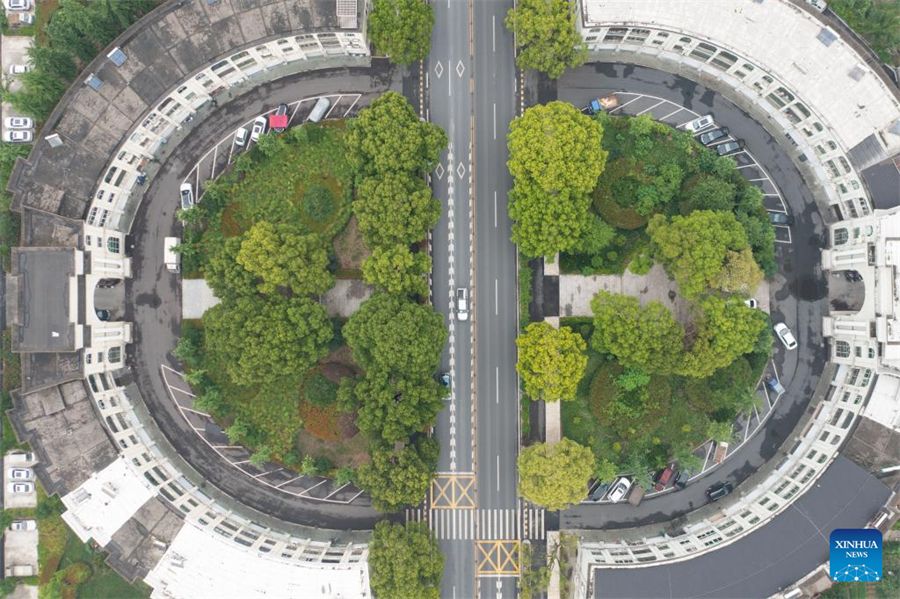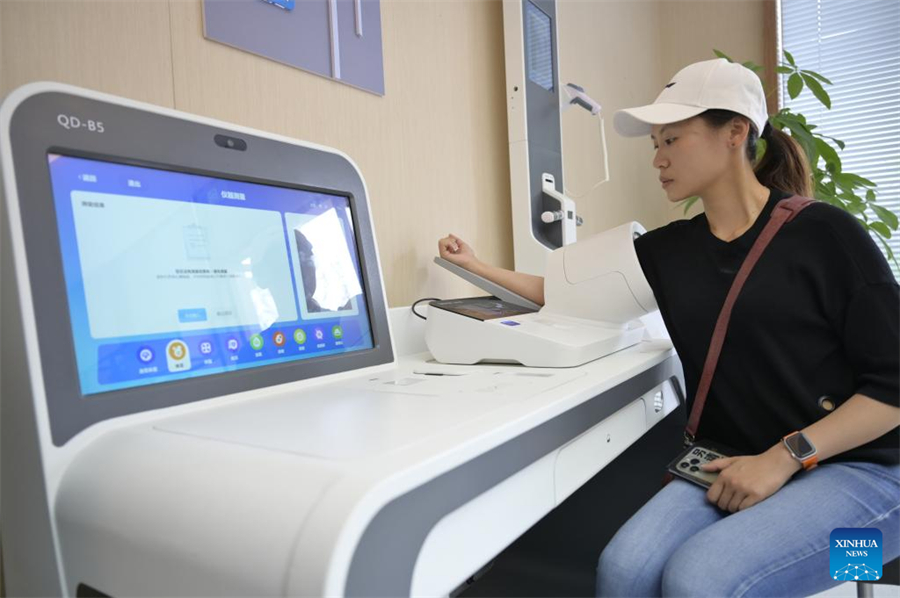Rural governance gets a digital upgrade in east China

This aerial photo taken on June 7, 2023 shows a view of Meilin Village in Xiaoshan District of Hangzhou, east China's Zhejiang Province.[Xinhua/Cai Yang]
HANGZHOU -- Many villagers in Zhejiang Province, a digital economy powerhouse in east China, now live even more modern lives than their city counterparts.
They are enjoying the great convenience brought by a number of digital public facilities, such as a 24-hour digital library, smart health service stations, unmanned gyms and unmanned supermarkets.
"Previously, we had to go to the city to see a doctor, and the cost of medicine and transportation was a big expense," said Wei Laifa, a resident in Meilin Village in the city of Hangzhou, Zhejiang. "Now the smart health service station in the village can solve the problem, and the medicine prescribed by hospitals in cities is also available here."
The 65-year-old villager said it was a visionary initiative that transformed their lives.
In June 2003, Zhejiang launched the Green Rural Revival Program, which involved renovating about 10,000 incorporated villages and transforming about 1,000 central villages among them into examples of moderate prosperity in all respects. Over two decades, the program has created tens of thousands of beautiful villages, fundamentally changing the face of the province's countryside.
Since 2021, the program has entered a new stage, aiming to create a situation of common prosperity for 10,000 villages in the province. A number of villages have innovated digital-driven rural governance paths with the support of science and technology, which has improved the efficiency of rural governance, while making it more accurate and scientific.
In Deqing County, Zhejiang, each of the 137 administrative villages has a 3D digital map with a panoramic view of the village. When visitors click the mouse, the spatial data and public data on the map immediately appears.
According to Jin Bin, director of the county's big-data development administration bureau, the map collects nearly 1.3 billion pieces of basic data in 282 categories, such as resources, weather, travel, garbage classification and convenience services.
"It's not just a digital map. It's a sensing network that reaches every corner of the countryside," said Sun Guowen, Party chief of Wusi Village in Deqing. All the information, such as something hanging on an electrical wire pole, rubbish thrown on the ground and streetlights not working, can be displayed and processed in real time on the platform.
In response to the high probability of traffic accidents involving the elderly in rural areas, Yuyue Town in Deqing has applied big-data technology to upload the accident hotspots to the digital map one by one, while strengthening daily prevention inspections in a targeted manner, with a total of 35 hidden dangers screened for.
While enjoying the improved convenience of life, villagers in Zhejiang are also more actively participating in rural governance.
When the streetlights in Meilin Village didn't work, the villagers scanned the QR code of the local public service to publish the information. Less than half an hour later, the village cadre on duty sent workers to repair the streetlights and give real-time situation feedback on the digital platform.
In Xiaogucheng Village, Hangzhou, a digital platform called the "People's Chamber" invited discussion on building and upgrading the overall landscape of the basic environment along a particular road. Many villagers were motivated to participate in the online discussion, including details such as the style of the walls and the scope of rectification.
Data shows that in 2022, the amount of funds invested in agriculture and rural digitalization in Zhejiang Province reached 13.26 billion yuan (about 1.84 billion U.S. dollars), driving social capital investment of 25.1 billion yuan.
Du Yingsen, director of the digital village research center at Zhejiang University, said that China's urban and rural development are at the same starting point because of digitalization, but the digitalization in the countryside is often more fragmented than in the city and needs further improvement.
In February, Zhejiang launched the construction of China's first "digital village leading zone" to further accelerate the comprehensive integration of the modern digital technology with rural production, life and ecology.

A woman gets her blood pressure measured at a smart health service station in Meilin Village of Xiaoshan District, Hangzhou, east China's Zhejiang Province, June 7, 2023. [Xinhua/Cai Yang]
























